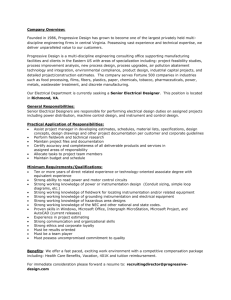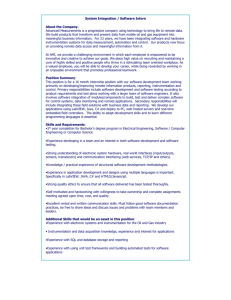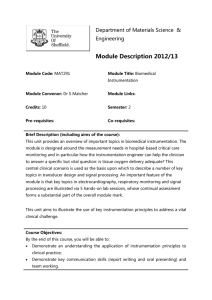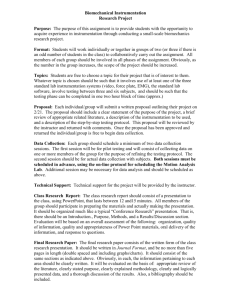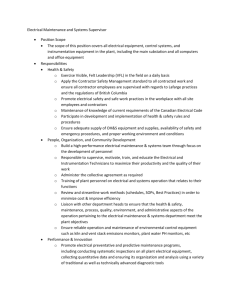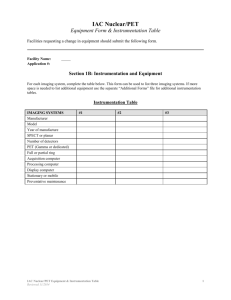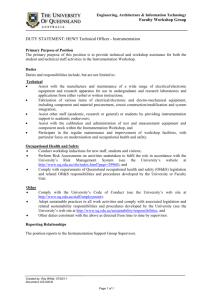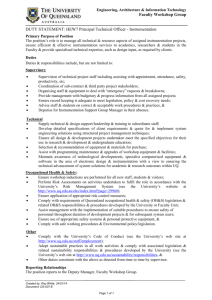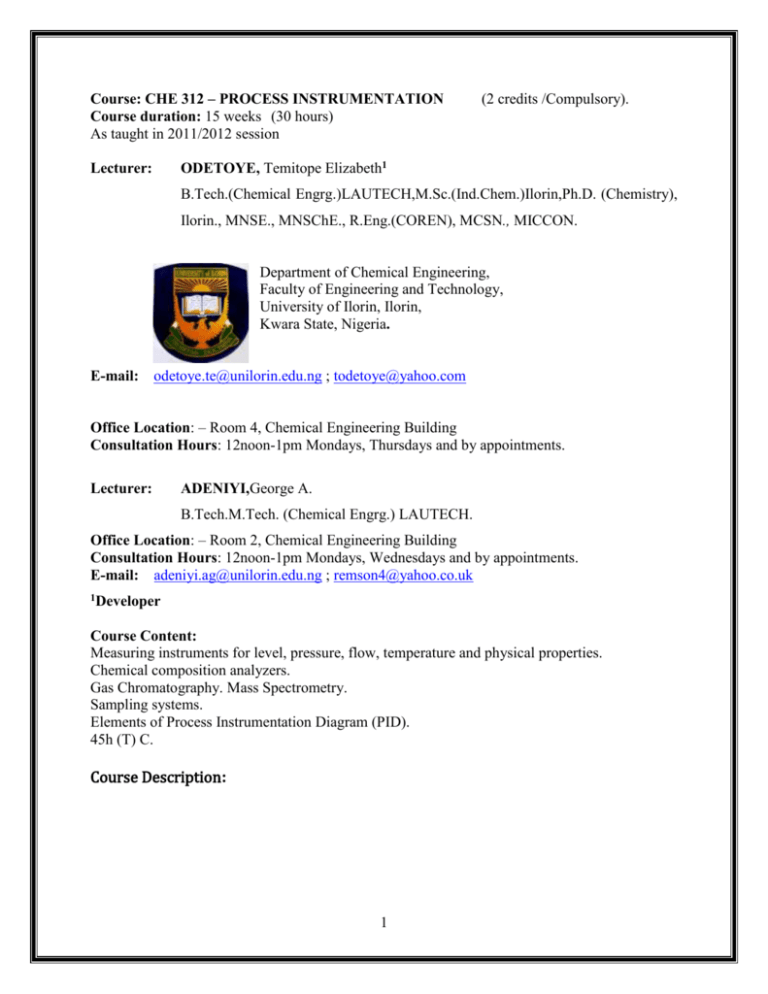
Course: CHE 312 – PROCESS INSTRUMENTATION
Course duration: 15 weeks (30 hours)
As taught in 2011/2012 session
Lecturer:
(2 credits /Compulsory).
ODETOYE, Temitope Elizabeth1
B.Tech.(Chemical Engrg.)LAUTECH,M.Sc.(Ind.Chem.)Ilorin,Ph.D. (Chemistry),
Ilorin., MNSE., MNSChE., R.Eng.(COREN), MCSN., MICCON.
Department of Chemical Engineering,
Faculty of Engineering and Technology,
University of Ilorin, Ilorin,
Kwara State, Nigeria.
E-mail: odetoye.te@unilorin.edu.ng ; todetoye@yahoo.com
Office Location: – Room 4, Chemical Engineering Building
Consultation Hours: 12noon-1pm Mondays, Thursdays and by appointments.
Lecturer:
ADENIYI,George A.
B.Tech.M.Tech. (Chemical Engrg.) LAUTECH.
Office Location: – Room 2, Chemical Engineering Building
Consultation Hours: 12noon-1pm Mondays, Wednesdays and by appointments.
E-mail: adeniyi.ag@unilorin.edu.ng ; remson4@yahoo.co.uk
1Developer
Course Content:
Measuring instruments for level, pressure, flow, temperature and physical properties.
Chemical composition analyzers.
Gas Chromatography. Mass Spectrometry.
Sampling systems.
Elements of Process Instrumentation Diagram (PID).
45h (T) C.
Course Description:
1
In order to achieve a successful operation of chemical plants we put the following requirements
into consideration- safety, production specifications, environmental regulations, operational
constraints and economics. There are many types of processes and processing equipment
(absorbers, heat exchangers, dryers, separators, reactors, distillation columns, pumps, etc). They
are connected together to reach the objectives of the plant - to produce a desired product from
the stock using the most safety and economical procedures. Therefore, we must be able at all
times control all process parameters and all operations of a plant. We can solve this problem by
using a control system, which consists of measuring devices, controllers, valves, computers,
transmission lines and intervention of plant personnel.
Course Justification:
The concepts and implementations of instrumentation and control are pertinent in all chemical
processes.In fact, they go well beyond chemical processes to manufacturing, research
laboratories, anywhere measurements must be made and systems regulated. Instrumentation and
control are essential to the operation of all modern processes.
Although many measurement principles and feedback control have been practiced for 2500 years
or so, their scientific understanding has been built in the 20th Century. This understanding is an
important element of your education, and the ability to put this understanding into practice is an
important professional skill for the chemical engineer.
This course transforms mathematics and theory into practice. The idealisms of theory confront
the realisms of actual systems. It is an interesting and compromising juxtaposition and is at the
heart of what engineering is all about.
Course Objectives:
The general objective of the course as an integral part of the B.Eng. (Chemical Engineering) is
to describe the significance of process instrumentation in the process industries.
At the end of the course, the students should be able to:
identify the use of instrumentation to suppress the influence of external disturbances, i.e.
the effect of surroundings on the process.
explain how to ensure the stability of a chemical process, i.e. to keep process
parameters (variables) as close as possible to their desired values;
To have an understanding of the importance of instrumentation in optimizing the
performance of a chemical process, i.e. to meet the requirements of safety, satisfaction
of production specification and maximizing of economic objectives.
identify various parameters and their measuring instruments in the chemical industries.
2
Course Requirements:
This is a compulsory course for students studying Chemical Engineering. Therefore,
students are expected to participate in all the course activities and have minimum of 75%
attendance to be able to write the final examination.
They will also be expected to treat the study questions and assignments.
Students are also expected to have e-mail accounts.
Methods of grading:
No
1.
2.
Item
Continuous Assessment
Examination
Total
Score %
30
70
100
Course Delivery Strategies:
The lecture will be delivered through face-to-face method, theoretical material (lecture note)
provided during lecture.
Students will be encouraged and required to read around the topics and follow current trends in
instrumentation through the media. Additional materials and links will be provided on the board.
The delivery strategies will also be supported by tutorial sessions and review of study questions.
LECTURES
Week 1: General concepts of process instrumentation
Objective: The student should be able to explain the concept of process instrumentation,
challenges and expectation for the study of the programme.
Description: The course outline will be introduced with emphasis on the objectives, the
definition and importance of process instrumentation to the chemical industries.
Study Questions:
1.
What is process intrumentation?
2.
Discuss the relationship between process instrumentation and process control.
3.
Explain the significance of process instrumentation to the chemical industry.
4.
Mention the objectives of the instrumentation in the control system.
5.
What are your expectations from this course?
Reading List:
Morris A. S. (2001)Measurement and Instrumentation Principles, Butterworth Heinmann,
Oxford,
Johnson C.D. (2006) Process Control Instrumentation Technology, 8th Edition: Pearson, Prentice
Hall.
Badalyan A. (2009) Process Instrumentation Lecture Notes.
Week 2-5:
Instrumentation for temperature, pressure and level measurements
3
Objective: The objective is for the student to be able to identify the impotance of the
parameters and the measuring instrument as well as the governing equations.
Description: Various types of Temperature, pressure and level measuring instruments will be
identified. the working equations will be derived for the various instruments.the
advantages and the diadvantages will also be considered.
Study questions:
1. Give five examples of pressure measuring devices
2. Explain their working principles
3. Mention various types of temperature measuring devices you know
4. List three examples of level measuring devices
5. Derive the working equation for one of the instruments
Reading List:
Morris A. S. (2001)Measurement and Instrumentation Principles, Butterworth Heinmann,
Oxford,
Johnson C.D. (2006) Process Control Instrumentation Technology, 8th Edition: Pearson, Prentice
Hall.
Week 6-10:
Instrumentation for flow and physical properties measurements
Objective:
To identify the various types of flow measuring instruments
Description: The principle of flow measurements will be considered, various types of flow
meters such as differential pressure flowmeters, variable area flowmeters, magnetic flow meters,
will be described, considering the working equations.The measurements of other physical
properties such as density, viscosity, turbidity will be described, identifying the working
principles for each.
Study questions:
1.
Explain the main types of flow meters.
2.
Derive the working equation of two types of flow meters
3.
Sketch the diagrams for three types of flow meters with full labellings
4.
What are the working principles for density and viscosity measuring devices
5.
Comment on the advantages and disadvantages of two different flow measuring
devices
Reading List:
Morris A. S. (2001)Measurement and Instrumentation Principles, Butterworth Heinmann,
Oxford,
Johnson C.D. (2006) Process Control Instrumentation Technology, 8th Edition: Pearson, Prentice
Hall.
Ogunnaike B.A and Ray W.H.(1994) Process Dynamics ,Modelling and Control, 3rd Ed.CRC
Press.
4
Week 11-13: Chemical composition analyzers; Gas Chromatography, Mass Spectrometry
Objective:
The objective of the week lecture is for the student to be able to explain these
methods of analyzing chemical composition.
Description: The principles behind and various types of Gas Chromatography will be
considered.The principle and use of Mass spectrometry in the industry will be
described.
Study questions:
1.
What is Gas Chromatography?
2.
Explain what you understand by Mass Spectrometry
3.
State the importance of these methods in composition analysis.
4.
Describe the principle behind Mass Spectrometry
5.
Explain the different types of Gas Chromatography
Assignments:
1 Explain five uses of Gas Chromatography in the industry.
2. Itemize the uses of various types of Gas Chromatography.
Reading List:
Morris A. S. (2001)Measurement and Instrumentation Principles, Butterworth Heinmann,
Oxford,
Johnson C.D. (2006) Process Control Instrumentation Technology, 8th Edition: Pearson, Prentice
Hall.
Week 13:
Elements of Process Instrumentation diagram (PID).
Objective: The main objective is for the student to be able to understand the basic concepts and
uses of PID in the industry
Description Process Instrumentation diagram (PID) is significant. For Chemical Engineers
involved in either design or production activity, it is necessary to be able to distinguish various
types of field and indoor instrumentation and control systems used for particular industrial
applications. In order to make layouts uniform and to visualise the process control system a set
of symbols was introduced.These symbols will be identified.
Study Questions:
1.
What is Process Instrumentation diagram?
2.
Explain the importance of Process Instrumentation diagram.
3.
Sketch three symbols used for industrial instrumentation
4.
What are the benefits of Process Instrumentation diagram
5.
Download and study samples of Process Instrumentation diagram for two different
processes
Reading List:
Morris A. S. (2001)Measurement and Instrumentation Principles, Butterworth Heinmann,
Oxford,
Johnson C.D. (2006) Process Control Instrumentation Technology, 8th Edition: Pearson, Prentice
Hall.
5

